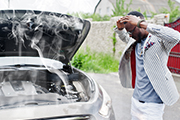Car Overheating Causes and Short-Term Solutions - Vol.465
 !
!
Car overheating not only occurs during summer days but also can occur in daily driving. In particular, during high-speed runs or driving over hill can cause a boiling phenomenon when the coolant temperature gets too high.
Overheating the engine can be dangerous and it can result in engine failure or even fire. Therefore, it is recommended that on highways drive at a higher speed or when climbing hills to keep an eye on the temperature gauge and if they reach the red zone and stay high take appropriate measures to prevent further damage.
There are many causes of overheating, including insufficient coolant, cooling fan failure, thermostat failure, and temperature sensor failure. Timely service can help to prevent this part from failure and can effectively reduce the risk of overheating.
Why overheating on the engine can be so risky to an engine.
1. Overheating can effectively reduce the aeration efficiency of your car, resulting in a drop in engine power.
2. The propensity for pre-ignition and deflagration increases, which disrupts the normal operation of the engine at the same time, it also causes early damage due to additional impact loads on the parts.
3. The normal gap of the moving parts is destroyed so that the parts cannot move normally, or even damage.
4. The mechanical properties of the metal material are reduced, causing damage to the part's deformation.
5. The deterioration of the lubrication condition exacerbates the friction and wear of the parts.
How is the engine overheating caused?
Expired coolant can be affected by temperature in the tank making it too hot and even starting to evaporate. The longer the coolant stays on the tank, the more internal scale will build up, resulting in poor heat dissipat
ion in the radiator. The coolant with too high a temperature will not dissipate the heat and instead, it would create a “pan” heat-up effect on the radiator.Additionally, blockage of the radiator holes can be also a common cause of poor heat dissipation. If a blockage is occurring on the outside of the radiator use a water gun to clean it up on the other hand If the inside of the radiator is blocked, then clean it with a cleaning solution.
Furthermore, the tightness of fan belts, as well as deformed or broken fans, can affect can have a serious impact on the vehicle's capacity to release heat creating an overheating in the car.
In addition, the thermostat can cause overheating. Due to that, it is responsible for automatically regulating the amount of coolant that is entering the radiator according to the temperature to ensure that the engine works within a suitable temperature range. If the engine is overheated, check that the thermostat is working properly. The thermostat should start to open at 70°C and be fully open at 83°C. When the height of the fully opened valve is not less than 9 mm. To check this, the thermostat can be put into boiling water for a heating inspection. If the thermostat cannot be opened during the test or it doesn’t fully open to the manufacturer's specs, the thermostat needs to be replaced.
Finally, be careful not fully shut down the engine when the engine is overheated please wait until the fans stop spinning by themselves before shutting down. Normally, People tend to feel that the engine will cool down more easily if it is shut down. However, the cooling fan and coolant circulation have a safety mode that increases the airflow during overheating to help to dissipate the heat faster and cool down the engine quicker. In addition, there are two fans in the engine room. One is a cooling fan that cools the engine while is working the other one is an air-conditioning fan that is used when the air conditioner is turned on.
Therefore, if the fan belt is not broken when the car is overheated, it is recommended to not fully shut down the engine, but also to turn on the air conditioner at the same time, so that the engine can be cooled at a faster rate.